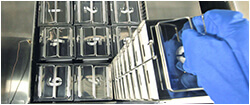Clinical lab services available
Working with a Clinical Laboratory Improvement Amendments (CLIA) certified laboratory offers several advantages, particularly in the context of healthcare, diagnostics, and research. Here are some reasons why individuals and organizations may choose to work with a CLIA-certified lab:
Compliance
CLIA certification ensures that the laboratory complies with federal regulatory standards for clinical testing. This includes adherence to quality control measures, proficiency testing, and other requirements to ensure the accuracy and reliability of test results.
Quality Assurance
CLIA-certified labs are committed to maintaining high standards of quality in laboratory testing. These labs implement rigorous quality control measures to ensure the accuracy, precision, and reliability of diagnostic test results.
Accurate and Reliable Test Results
CLIA certification indicates that the laboratory has demonstrated proficiency in conducting tests accurately and reliably. This is crucial for ensuring that healthcare providers and patients can trust the results for making informed medical decisions.
Patient Safety
CLIA regulations are designed to prioritize patient safety by setting standards for the quality and accuracy of laboratory testing. Compliance with CLIA requirements helps minimize the risk of diagnostic errors that could impact patient care.
It is exciting to see Saba in action. You can quickly sense his understanding and passion while he works the team towards a goal.
Legal and Reimbursement Considerations
Many healthcare providers and institutions are required to use CLIA-certified labs to meet legal and regulatory requirements. Additionally, reimbursement by health insurance programs often requires that tests are conducted in CLIA-certified laboratories.
Interoperability and Data Sharing
CLIA certification facilitates interoperability and data sharing between laboratories and healthcare systems. Standardized practices ensure that test results can be easily communicated and integrated into electronic health records (EHRs).
Research Collaboration
Researchers often choose to work with CLIA-certified labs when clinical validation or testing is required for their studies. Collaborating with a certified lab ensures that the results meet regulatory and quality standards.
Development of Diagnostic Tests
Companies developing diagnostic tests or new assays often work with CLIA-certified labs to validate and verify the performance of their assays before seeking regulatory approval or clearance.
Pharmaceutical Trials
Clinical trials for drug development often require the analysis of biological samples. CLIA-certified labs are trusted partners for conducting laboratory tests in clinical trial settings, ensuring the accuracy of data generated during the trial.
Continuing Education and Training
CLIA certification requires ongoing education and training for laboratory personnel. This commitment to professional development ensures that the staff remains updated on the latest advancements in laboratory medicine and technology.

BioStorage
See why we’re San Diego’s leading storage provider for the biopharma and device industries.
